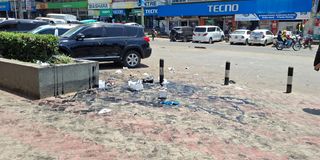The untouchable con artists of Kenyatta Avenue and why police and county seem to be powerless to stop them

Residents surround a tent along Kenyatta avenue in Nakuru where con artists are said to take advantage of unsuspecting passers by.
When a makeshift con shop mushroomed along Kenyatta Avenue in October 2024, residents of Nakuru City raised the alarm.
What began as quiet complaints about unsuspecting passers-by losing money to con games soon turned into a social media storm, fuelled by Mtaa Wangu’s exclusive coverage of the scam.
The exposé revealed the brazenness of the operations and the frustrations of residents who felt abandoned by the authorities.
What followed was an unpredictable cycle of denial, blame-shifting and prolonged inaction by county officials. Even after we revealed that the group behind the scam had somehow secured a business permit, the county distanced itself.
It was not government intervention, but community anger that finally ended the con artists’ reign along Kenyatta Avenue when residents demolished the tent.
Months later, history repeated itself outside KANU House.

Spot where the con was happening burnt down on October 2, 2025 outside Kanu house.
A new group of swindlers set up base there, once again targeting unsuspecting victims. By then, residents had learned the bitter truth that, despite their loud online protests and media coverage, the county government was either unwilling or unable to act.
When we contacted them again in October, county officials still denied that the group had any legal operating space. Instead, they argued that the con artists were hiding behind a court order and had even sued the county for harassment.
However, when pressed to show progress on the harassment suit, the county offered nothing concrete.
This recurring drama exposes a deeper governance problem, which John Gethanga, a civil rights leader, sheds light on by providing a brief history.

Spot where the con was happening burnt down on October 2, 2025 outside Kanu house.
He says that word on the street is that the group was first dissolved by a 'gang' in Bondeni, who acted after a local resident complained of being conned. Despite witnessing this, the group in the KANU house continued with their business.
"The second group arrived before August. I received a tip about how they were conducting their business, so I reached out to the authorities, who made arrests. But the following day, they were back," says Gethanga.
Fast forward to October 2, 2025, and he confirms that the dissolution may have been handled by ‘professionals’ as opposed to residents.
"People were very angry with the group and the authorities, which made them feel hopeless," he says, adding that the ‘con’ group were beaten, arrested and had their property broken and burned.
Despite this, he has heard that a similar group is emerging in Section 58, and that these groups are allegedly interconnected and protected by higher authorities. They are not indigenous to Nakuru.
Alseba Akinyi, whose story we highlighted at the start of this series when she fell victim to the cons, agrees with Gethanga and hopes that this will be the last of the group.
"These cons have gone on for so long, and it is good that some action has been taken. To deal with the trauma, I avoided the route I was conned on for a long time. Even nowadays, I avoid groups of people and refuse to engage with strangers because of it,” she says.
The question now is not whether the scams will resurface, but how long Nakuru residents will continue to battle them without meaningful support from the county administration, which is constitutionally mandated to regulate trade, enforce bylaws and protect public order.
Until then, con artists may keep reinventing themselves, and residents will keep fighting battles that are not theirs to fight.

